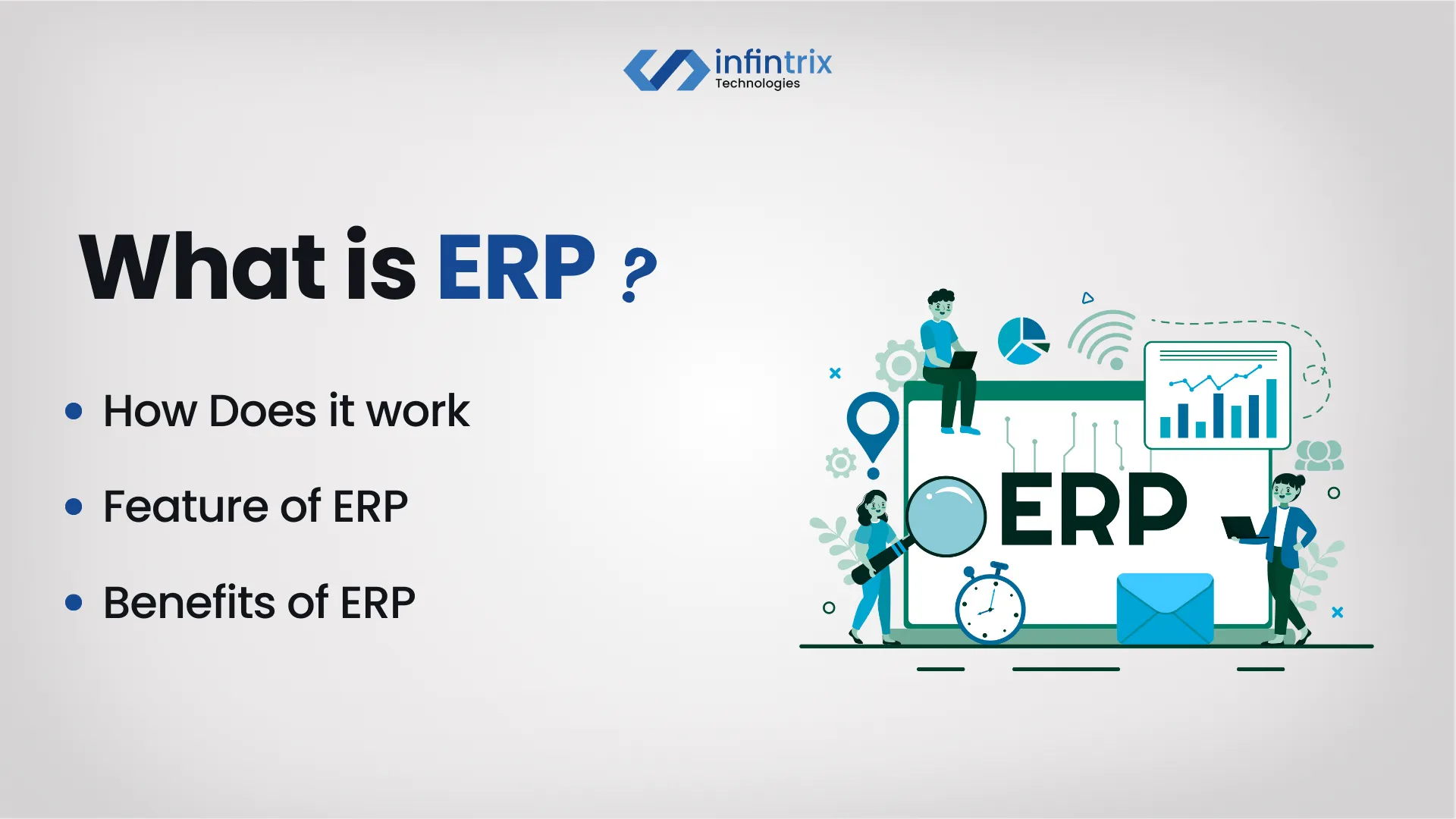In today’s rapidly evolving business world, businesses are continually finding ways to smooth their operations and processes improve collaboration, and enhance decision-making. One tool that stands out in this regard is Enterprise Resource Planning (ERP).
But what exactly is ERP, and how does it work? In this guide, we’ll take a deep dive into ERP, exploring its definition, benefits, and functionality. In this article, your every query related to ERP might be resolved.
What is ERP Software?
Enterprise Resource Planning (ERP) refers to integrated software systems that help businesses automate, manage, and analyze critical operations such as finance, human resources, inventory, procurement, and customer relationship management (CRM). By unifying all business processes into one central platform, ERP provides real-time data and insights, which improve productivity, efficiency, and decision-making.
ERP solutions are designed to reduce complexity and increase transparency across an organization. Whether you are a small startup or a large enterprise, ERP systems can help streamline your operations and ensure that your business runs more smoothly.
How Does ERP Work?
ERP systems operate by integrating multiple business processes into a unified system. This streamlines data sharing, reduces manual work, and enhances accuracy. Here’s how it functions:
1. Centralized Data Management:
All business data is stored in a single database, ensuring consistency and access across departments.
Task Automation: ERP automates repetitive activities like invoicing, payroll, and stock tracking, reducing the likelihood of human error.
2. Flexible Configuration:
Modern ERP solutions are customizable, meaning they can be tailored to meet the specific needs of industries like retail, manufacturing, or healthcare.
3. Instant Access to Insights:
Real-time analytics and dashboards empower teams to make informed decisions quickly.
Core Features of ERP Systems
Understanding ERP’s main features helps businesses gauge its impact. Key features include:
Financial Management:
ERP systems track and manage financial data such as accounts payable, receivable, and general ledger. They also handle budgeting, financial reporting, and compliance, making it easier for companies to manage their finances.
Supply Chain and Inventory Management:
With real-time inventory tracking and automated procurement processes, ERP systems optimize supply chain management. This helps businesses maintain optimal stock levels, prevent stockouts, and reduce waste.
Customer Relationship Management (CRM):
ERP systems improve customer related service by providing current data on customer interactions, sales opportunities, and support tickets. This ensure businesses to reply quickly to customer inquiries and enhance customer satisfaction.
Human Resource Management:
ERP systems streamline HR processes, including payroll, recruitment, employee performance management, and training. This enables HR teams to focus on employee development and engagement rather than administrative tasks.
Analytics and Reporting:
ERP software includes business intelligence tools that generate actionable insights from large sets of data. By leveraging these reports, businesses can make more informed decisions and identify trends that impact their bottom line.
ERP vs MRP vs CRM – Quick Comparison
| System | Main Focus | Best For | Doesn’t Cover |
| ERP | Company-wide operations & finance | End-to-end visibility | None (umbrella) |
| MRP | Material & production planning | Manufacturers | Finance, HR, CRM |
| CRM | Leads, sales, and customer support | Sales-led teams | Inventory, accounting |
Key Benefits of ERP for Businesses
The adoption of an ERP system provides a wide range of benefits to organizations of all sizes. Some of the most significant advantages include:
1. Increased Efficiency:
By automating routine tasks and centralizing data, ERP systems reduce the need for manual intervention and streamline business processes. This leads to more efficient operations and lower overhead costs.
2. Cost Reduction:
ERP helps identify areas where resources are being underutilized or wasted. By optimizing resource allocation and improving forecasting, businesses can reduce operating costs and improve profitability.
3. Enhanced Collaboration:
Since ERP systems integrate data from all departments, teams can collaborate more effectively. Sales teams, customer service reps, and inventory managers all work with the same data, leading to improved communication and better decision-making.
4. Data Security and Compliance:
ERP systems provide enhanced data security through user access controls and data encryption. Moreover, ERP systems can help ensure compliance with industry standards and regulations by tracking data and reporting in real-time.
5. Scalability for Business Growth:
ERP solutions are designed to grow with your business. As your company expands, an ERP system can scale to meet new challenges, such as managing more inventory or handling larger volumes of transactions.
Types of ERP Systems
ERP systems come in different configurations, each catering to different business needs. Here are the three main types:
1. On-Premise ERP:
On-premise ERP is hosted and maintained within a company’s own data center. This type of ERP offers complete control over data and security but requires significant upfront investment in hardware, software, and IT resources.
2. Cloud ERP:
Cloud ERP is hosted on the cloud, allowing businesses to access the system over the internet. This eliminates the need for costly infrastructure and IT maintenance while offering flexibility, scalability, and remote access. Cloud ERP is typically offered as a subscription service.
3. Hybrid ERP:
A hybrid ERP combines both on-premise and cloud-based solutions. This allows businesses to enjoy the benefits of cloud computing while retaining control over sensitive data stored on-premise. Hybrid systems offer greater flexibility and customization options.
Costs & ROI of ERP Systems
- Software Licensing: Open-source (like ERPNext) can be free, while commercial ERPs (like SAP, Oracle) range from $50–$250 per user/month.
- Implementation Costs: Typically $10,000–$150,000 depending on company size, modules, and customization.
- Support & Training: Usually 15–25% of license cost per year.
- ROI Timeline: Most SMBs see efficiency gains and cost recovery within 12–24 months.
Who Needs ERP? (By Size & Industry):
- Small Businesses (SMBs): Need ERP for accounting, invoicing, and basic inventory.
- Mid-sized Companies: Use ERP for multi-location operations, HR, supply chain, and CRM integration.
- Enterprises: Require ERP for global operations, compliance, automation, and large-scale production.
Industries that Benefit Most:
- Manufacturing: Streamlined production & supply chain.
- Retail & eCommerce: Real-time stock & order management.
- Healthcare: Patient data, compliance, and billing.
- Pharmaceutical: Regulatory compliance & batch tracking.
- Education: Student data & administration.
How to Choose the Right ERP System for Your Business
Selecting the right ERP solution is a critical decision that requires careful consideration. Here’s how you can choose the ideal ERP for your business:
1. Assess Your Needs:
Begin by identifying your organization’s specific requirements, such as inventory management, financial reporting, and human resources. Prioritize the features that are essential to your business.
2. Evaluate Vendors:
Research various ERP vendors and compare their features, pricing, and customer support. Read reviews, request demos, and ask for references to ensure the vendor is reliable.
3. Consider Integration:
Make sure the ERP system integrates well with other tools and platforms used by your organization, such as CRM, eCommerce, and third-party applications.
4. Scalability:
Choose an ERP solution that can scale with your business. It should be able to grow and adapt as your company expands.
5. Budget:
Keep in mind your budget and long-term costs. While ERP systems can require significant investment, the benefits often outweigh the initial costs, especially for larger organizations.
ERP Implementation: Timeline & Risks:
Typical Timeline: 8–16 weeks for SMBs; 6–12 months for enterprises.
Risks to Watch Out For:
- Poor data migration (dirty/incomplete data).
- Low user adoption due to lack of training.
- Budget overruns from unplanned customization.
Pro Tip: Partner with an ERP expert (like Infintrix Technologies) to reduce risks and speed up adoption.
Frequently Asked Questions (FAQs)
Q1: What is an ERP system?
A: ERP is software that unifies finance, HR, inventory, CRM, and more into a single database, helping businesses streamline operations.
Q2: What are the core ERP modules?
A: Common modules include Accounting, Inventory, HR/Payroll, CRM, Manufacturing, and Projects.
Q3: How long does ERP implementation take?
A: For SMBs, typically 8–16 weeks; larger enterprises may take 6–12 months.
Q4: How much does ERP cost?
A: Ranges from free (open-source ERPNext pricing) to $50–$250/user/month for commercial ERPs, plus implementation & support.
Q5: Which industries benefit most from ERP?
A: Manufacturing, retail, healthcare, pharmaceuticals, and education.
Conclusion:
In conclusion, ERP systems offer numerous benefits for businesses looking to streamline their operations, improve collaboration, and make better data-driven decisions. By combining organization functions and automating routine tasks, ERP allows organizations to become more efficient and responsive to market demands. Whether you’re a small business or a large enterprise, adopting an ERP system is a strategic move that can unlock new growth opportunities and ensure long-term success.
If you’re looking to optimize your business operations, consider partnering with Infintrix Technologies for a tailored ERP solution. We specialize in implementing customized ERP systems that suit your business needs, driving efficiency, and fostering growth.

